Chateaux n°2 2017 (Excerpt)
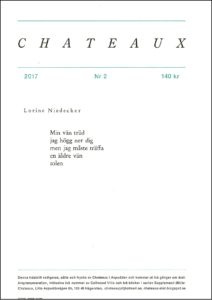
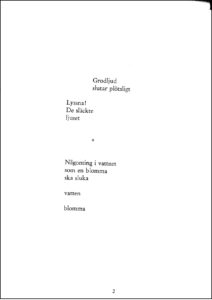
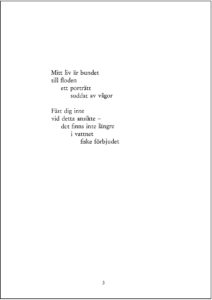
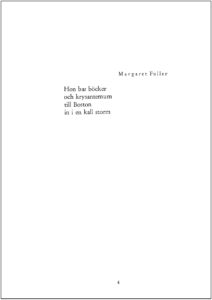
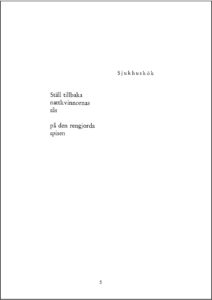
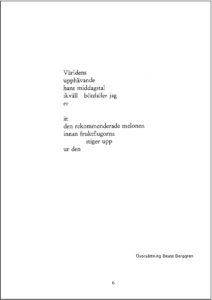
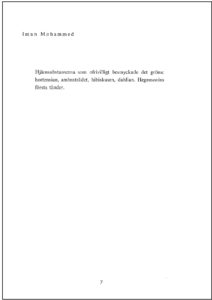
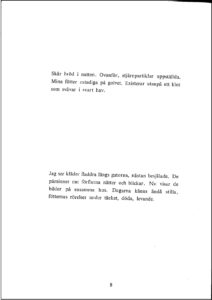
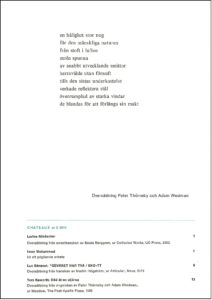
Bonus material: Collwood Villa and Slot
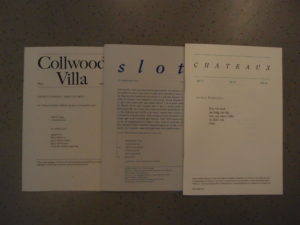
Collwood Villa n°2 2017
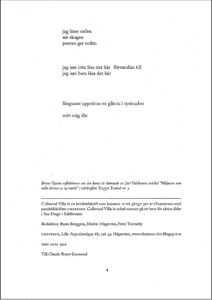
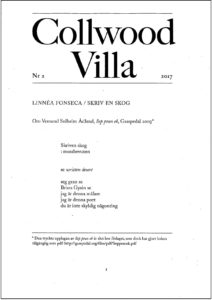
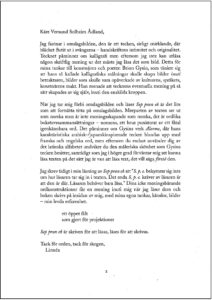
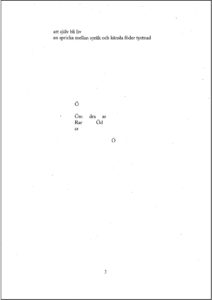
Slot n°16 printemps 2017.
Éditeur de Slot n°16: Victoria Xardel.
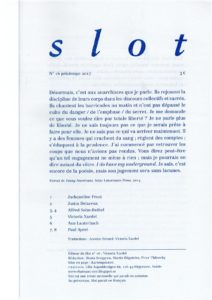
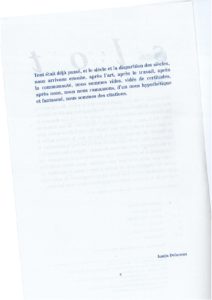
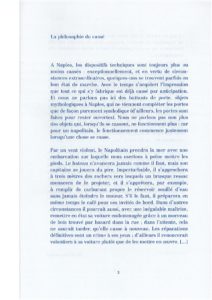

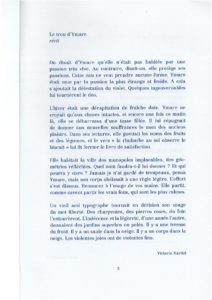
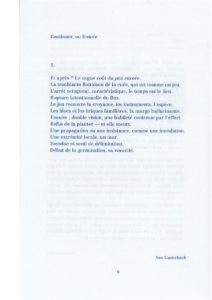
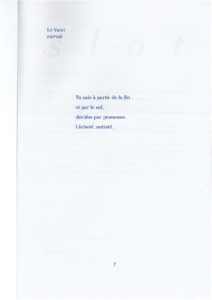
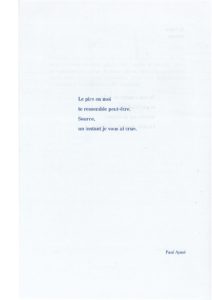
Chateaux n°2 2017 (Excerpt)









Bonus material: Collwood Villa and Slot

Collwood Villa n°2 2017




Slot n°16 printemps 2017.
Éditeur de Slot n°16: Victoria Xardel.








Italo Calvino, Six Memos For The New Millenium (excerpt), trans. Patrick Creagh, Harvard University Press, Cambridge 1988.
Lightness
I will devote my first lecture to the opposition between lightness and weight, and will uphold the values of lightness. This does not mean that I consider the virtues of weight any less compelling, but simply that I have more to say about lightness.
After forty years of writing fiction, after exploring various roads and making diverse experiments, the time has come for me to look for an overall definition of my work. I would suggest this: my working method has more often than not involved the subtraction of weight. I have tried to remove weight, sometimes from people, sometimes from heavenly bodies, sometimes from cities; above all I have tried to remove weight from the structure of stories and from language.
In this talk I shall try to explain—both to myself and to you—why I have come to consider lightness a value rather than a defect; to indicate the works of the past in which I recognize my ideal of lightness; and to show where I situate this value in the present and how I project it into the future.
I will start with the last point. When I began my career, the categorical imperative of every young writer was to represent his own time. Full of good intentions, I tried to identify myself with the ruthless energies propelling the events of our century, both collective and individual. I tried to find some harmony between the adventurous, picaresque inner rhythm that prompted me to write and the frantic spectacle of the world, sometimes dramatic and sometimes grotesque. Soon I became aware that between the facts of life that should have been my raw materials and the quick light touch I wanted for my writing, there was a gulf that cost me increasing effort to cross. Maybe I was only then becoming aware of the weight, the inertia, the opacity of the world–qualities that stick to writing from the start, unless one finds some way of evading them.
At certain moments I felt that the entire world was turning into stone: a slow petrification, more or less advanced depending on people and places but one that spared no aspect of life. It was as if no one could escape the inexorable stare of Medusa. The only hero able to cut off Medusa’s head is Perseus, who flies with winged sandals; Perseus, who does not turn his gaze upon the face of the Gorgon but only upon her image reflected in his bronze shield. Thus Perseus comes to my aid even at this moment, just as I too am about to be caught in a vise of stone–which happens every time I try to speak about my own past. Better to let my talk be composed of images from mythology.
To cut off Medusa’s head without being turned to stone, Perseus supports himself on the very lightest of things, the winds and the clouds, and fixes his gaze upon what can be revealed only by indirect vision, an image caught in a mirror. I am immediately tempted to see this myth as an allegory on the poet’s relationship to the world, a lesson in the method to follow when writing. But I know that any interpretation impoverishes the myth and suffocates it. With myths, one should not be in a hurry. It is better to let them settle into the memory, to stop and dwell on every detail, to reflect on them without losing touch with their language of images. The lesson we can learn from a myth lies in the literal narrative, not in what we add to it from the outside.
The relationship between Perseus and the Gorgon is a complex one and does not end with the beheading of the monster. Medusa’s blood gives birth to a winged horse, Pegasus—the heaviness of stone is transformed into its opposite. With one blow of his hoof on Mount Helicon, Pegasus makes a spring gush forth, where the Muses drink. In certain versions of the myth, it is Perseus who rides the miraculous Pegasus, so dear to the Muses, born from the accursed blood of Medusa. (Even the winged sandals, incidentally, come from the world of monsters, for Perseus obtained them from Medusa’s sisters, the Graiae, who had one tooth and one eye among them.) As for the severed head, Perseus does not abandon it but carries it concealed in a bag. When his enemies are about to overcome him, he has only to display it, holding it by its snaky locks, and this bloodstained booty becomes an invincible weapon in the hero’s hand. It is a weapon he uses only in cases of dire necessity, and only against those who deserve the punishment of being turned into statues. Here, certainly, the myth is telling us something, something implicit in the images that can’t be explained in any other way. Perseus succeeds in mastering that horrendous face by keeping it hidden, just as in the first place he vanquished it by viewing it in a mirror. Perseus’s strength always lies in a refusal to look directly, but not in a refusal of the reality in which he is fated to live; he carries the reality with him and accepts it as his particular burden.
On the relationship between Perseus and Medusa, we can learn something more from Ovid’s Metamorphoses. Perseus wins another battle: he hacks a sea-monster to pieces with his sword and sets Andromeda free. Now he prepares to do what any of us would do after such an awful chore—he wants to wash his hands. But another problem arises: where to put Medusa’s head. And here Ovid has some lines (IV.740-752) that seem to me extraordinary in showing how much delicacy of spirit a man must have to be a Perseus, killer of monsters: “So that the rough sand should not harm the snake-haired head (anquiferumque caput dura ne laedat harena), he makes the ground soft with a bed of leaves, and on top of that he strews little branches of plants born under water, and on this he places Medusa’s head, face down.” I think that the lightness, of which Perseus is the hero, could not be better represented than by this gesture of refreshing courtesy toward a being so monstrous and terrifying yet at the same time somehow fragile and perishable. But the most unexpected thing is the miracle that follows: when they touch Medusa, the little marine plants turn into coral and the nymphs, in order to have coral for adornments, rush to bring sprigs and seaweed to the terrible head.
This clash of images, in which the fine grace of the coral touches the savage horror of the Gorgon, is so suggestive that I would not like to spoil it by attempting glosses or interpretations. What I can do is to compare Ovid’s lines with those of a modern poet, Eugenio Montale, in his “Piccolo testamento,” where we also find the subtlest of elements—they could stand as symbols of his poetry: “traccia madreperlacea di lumaca / o smeriglio di vetro calpestato” (mother-of-pearl trace of a snail / or mica of crushed glass)—put up against a fearful, hellish monster, a Lucifer with pitch-black wings who descends upon the cities of the West. Never as in this poem, written in 1953, did Montale evoke such an apocalyptic vision, yet it is those minute, luminous tracings that are placed in the foreground and set in contrast to dark catastrophe—”Conservane la cipria nello specchietto / quando spenta ogni lampada / la sardana si farà infernale” (Keep its ash in your compact / when every lamp is out / and the sardana becomes infernal). But how can we hope to save ourselves in that which is most fragile? Montale’s poem is a profession of faith in the persistence of what seems most fated to perish, in the moral values invested in the most tenuous traces: “il tenue bagliore strofinato / laggiù non era quello d’un fiammifero” (the thin glimmer striking down there / wasn’t that of a match).*
In order to talk about our own times I have gone the long way around, calling up Ovid’s fragile Medusa and Montale’s black Lucifer. It is hard for a novelist to give examples of his idea of lightness from the events of everyday life, without making them the unattainable object of an endless quête. This is what Milan Kundera has done with great clarity and immediacy. His novel The Unbearable Lightness of Being is in reality a bitter confirmation of the Ineluctable Weight of Living, not only in the situation of desperate and all-pervading oppression that has been the fate of his hapless country, but in a human condition common to us all, however infinitely more fortunate we may be. For Kundera the weight of living consists chiefly in constriction, in the dense net of public and private constrictions that enfolds us more and more closely. His novel shows us how everything we choose and value in life for its lightness soon reveals its true, unbearable weight. Perhaps only the liveliness and mobility of the intelligence escape this sentence—the very qualities with which this novel is written, and which belong to a world quite different from the one we live in.
Whenever humanity seems condemned to heaviness, I think I should fly like Perseus into a different space. I don’t mean escaping into dreams or into the irrational. I mean that I have to change my approach, look at the world from a different perspective, with a different logic and with fresh methods of cognition and verification. The images of lightness that I seek should not fade away like dreams dissolved by the realities of present and future . . . . .
In the boundless universe of literature there are always new avenues to be explored, both very recent and very ancient, styles and forms that can change our image of the world . . . . . But if literature is not enough to assure me that I am not just chasing dreams, I look to science to nourish my visions in which all heaviness disappears. Today every branch of science seems intent on demonstrating that the world is supported by the most minute entities, such as the messages of DNA, the impulses of neurons, and quarks, and neutrinos wandering through space since the beginning of time . . . . .
Then we have computer science. It is true that software cannot exercise its powers of lightness except through the weight of hardware. But it is software that gives the orders, acting on the outside world and on machines that exist only as functions of software and evolve so that they can work out ever more complex programs. The second industrial revolution, unlike the first, does not present us with such crushing images as rolling mills and molten steel, but with “bits” in a flow of information traveling along circuits in the form of electronic impulses. The iron machines still exist, but they obey the orders of weightless bits.
Is it legitimate to turn to scientific discourse to find an image of the world that suits my view? If what I am attempting here attracts me, it is because I feel it might connect with a very old thread in the history of poetry.
The De Rerum Natura of Lucretius is the first great work of poetry in which knowledge of the world tends to dissolve the solidity of the world, leading to a perception of all that is infinitely minute, light, and mobile. Lucretius set out to write the poem of physical matter, but he warns us at the outset that this matter is made up of invisible particles. He is the poet of physical concreteness, viewed in its permanent and immutable substance, but the first thing he tells us is that emptiness is just as concrete as solid bodies. Lucretius’ chief concern is to prevent the weight of matter from crushing us. Even while laying down the rigorous mechanical laws that determine every event, he feels the need to allow atoms to make unpredictable deviations from the straight line, thereby ensuring freedom both to atoms and to human beings. The poetry of the invisible, of infinite unexpected possibilities—even the poetry of nothingness—issues from a poet who had no doubts whatever about the physical reality of the world.
This atomizing of things extends also to the visible aspects of the world, and it is here that Lucretius is at his best as a poet: the little motes of dust swirling in a shaft of sunlight in a dark room (II.114-124); the minuscule shells, all similar but each one different, that waves gently cast up on the bibula harena, the “imbibing sand” (II.374-376); or the spiderwebs that wrap themselves around us without our noticing them as we walk along (III.381-390).
I have already mentioned Ovid’s Metamorphoses, another encyclopedic poem (written fifty years after Lucretius’), which has its starting point not in physical reality but in the fables of mythology. For Ovid, too, everything can be transformed into something else, and knowledge of the world means dissolving the solidity of the world. And also for him there is an essential parity between everything that exists, as opposed to any sort of hierarchy of powers or values. If the world of Lucretius is composed of immutable atoms, Ovid’s world is made up of the qualities, attributes and forms that define the variety of things, whether plants, animals, or persons. But these are only the outward appearances of a single common substance that—if stirred by profound emotion—may be changed into what most differs from it.
It is in following the continuity of the passage from one form to another that Ovid displays his incomparable gifts. He tells how a woman realizes that she is changing into a lotus tree: her feet are rooted to the earth, a soft bark creeps up little by little and enfolds her groin; she makes a movement to tear her hair and finds her hands full of leaves. Or he speaks of Arachne’s fingers, expert at winding or unraveling wool, turning the spindle, plying the needle in embroidery, fingers that at a certain point we see lengthening into slender spiders’ legs and beginning to weave a web.
In both Lucretius and Ovid, lightness is a way of looking at the world based on philosophy and science: the doctrines of Epicurus for Lucretius and those of Pythagoras for Ovid (a Pythagoras who, as presented by Ovid, greatly resembles the Buddha). In both cases the lightness is also something arising from the writing itself, from the poet’s own linguistic power, quite independent of whatever philosophic doctrine the poet claims to be following.
*The English translation of these lines from Montale’s “Little Testament” has been provided by Jonathan Galassi.
Italo Calvino, Six Memos For The New Millenium (excerpt), trans. Patrick Creagh, Harvard University Press, Cambridge 1988.
Full text: sixmemos_italocalvino